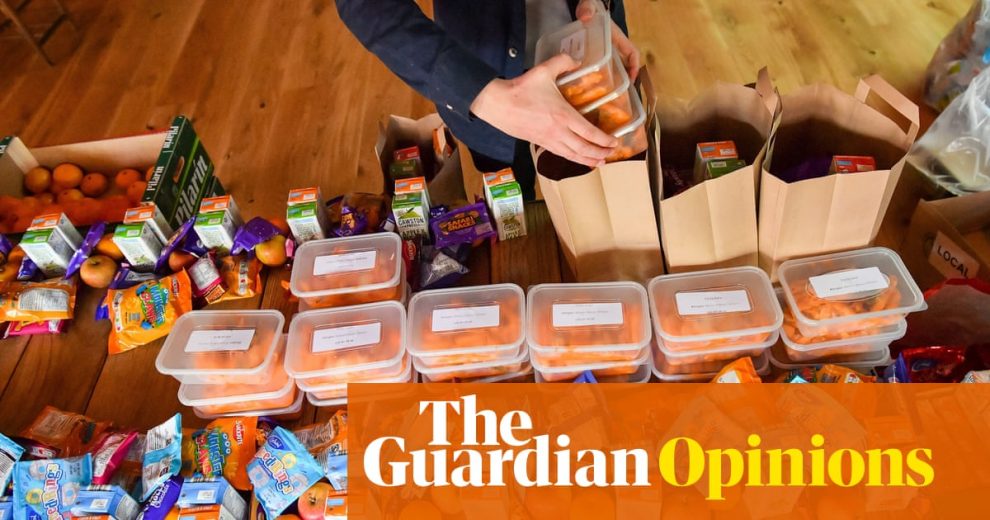Some carefully neutral observers are keen to stress that children going hungry isn’t a political issue; but, 10 years on from the Conservative-Liberal Democrat coalition’s policy of callous cuts to social support to balance the banking bailouts, it’s clear this is one of the hottest political potatoes of our times.
Matt Hancock said today that he believes local councils are the most appropriate purse-holders to solve the complex tapestry of food poverty in England. This idea could be almost feasible, if only those same local councils weren’t holding their tapestries together with straining fingers and thin prayers. There are so many holes in what used to be a welfare safety net – deliberately and maliciously sabotaged rather than through natural wear and tear – that the health secretary’s thinking is akin to trying to catch whitebait in a whale net.
I honestly don’t believe any of the “superforecasters” inside No 10 actually think that far ahead. If they did, they could superforecast that hungry children are disruptive children; they’re distracted children; they’re not able to reach their full potential in the classroom. Poverty isolates, devastates and discriminates. They could superforecast that investing in children’s health and wellbeing, physically and emotionally, in the early years will always pay for itself in the long term.
All weekend on Twitter, people have been costing boiled eggs, pretending that they would be so much better at playing poor than actual poor people are. I’ve said it a thousand times: it’s easy to live simply and frugally when you have a secure roof over your head, your heating hasn’t been cut off, there’s water in the taps, and nobody’s banging on your door for council tax arrears. It’s simple to boil a 12p egg in your saucepan if you’ve the 99p to buy the whole box, and a saucepan to go with it.
I’ve spent the last seven years working almost daily with families and individuals in food poverty. I’ve been a part of the Feeding Britain inquiry, forced a debate on food bank use and hunger in parliament, consulted on the School Food Plan and Henry Dimbleby’s national food strategy, which Marcus Rashford is indefatigably clobbering the government over the head with.
I’ve worked with refuges, hostels, homeless shelters, halfway houses, schools, universities, and what’s left of Sure Start children’s centres. I’ve given talks to thousands of housing professionals, local authority staff and political party conference attendees, about the realities of hunger and poverty, and how to help. But it increasingly feels as though we are all shouting into a hurricane. The rich photograph their boiled eggs to make a sanctimonious point, and the poor sit behind closed doors, afraid to speak up lest they be judged for their appearance, their diet, or their smartphone.
When I got my first cookbook deal, for recipes created from boxes from food banks and with handfuls of change, I was advised to “dial down on the politics” as “being seen to be more neutral would make me more of a palatable offering for the Waitrose set”. I didn’t so much refuse as simply lack the capacity to separate ultra-low-budget cookery lessons from the reasons why people may be searching for ways to eke out their last five quid in the first place.
It’s impossible for me to gloss over the long-term impact of that period of my life – and I continue to talk about it not for sympathy but because it is a similar story to one I have heard thousands of times over the years. The lasting trauma, the inability to open the mail – especially anything in a brown envelope or that looks like a bill. The holding of breath as you enter your pin at a supermarket checkout. The heart hammering if the transaction takes a fraction of a second longer than it should. The forensic calculation, with an actual calculator, walking around the supermarket agonising over what to put in the basket and what to leave out this week. The cold that gets into your bones, the damp in your home that’s worse for health than long-term smoking, the musty smell that lingers on clothes that never quite dry out.
Child poverty and hunger are not simple problems and, as heartening as the efforts of individuals, local businesses and organisations to plug the deficit of school meals this half-term are, it’s not something that can be resolved by food collections alone. Of course the immediate priority is to feed the hungry. But long term, we need a reckoning as to how so many people have ended up at the doors of food banks; how so many people are falling into desperate situations. And we need a solid plan of action to rectify the damage that a decade of austerity has wrecked on the most vulnerable.
When the Feeding Britain report was published in 2014, work and pensions secretary Iain Duncan Smith said he would give its 77 recommendations “serious consideration”. The food strategy that Rashford is calling for was commissioned by Michael Gove when he was environment secretary. It’s time that these inquiries and reports were properly implemented.
We’ve been shouting for so long that our voices are hoarse, and all that changes is the queues at the food banks get longer and longer. It’s not the poor in this country who aren’t working – after all, the number of households in poverty where at least one adult works is at a record high – it’s the government.
• Jack Monroe is a campaigner and author
This content was originally published here.
EL 2 DE JUNIO DEL 2024 VOTA PARA MANTENER
TU LIBERTAD, LA DEMOCRACIA Y EL RESPETO A LA CONSTITUCIÓN.
VOTA POR XÓCHITL













Comentarios